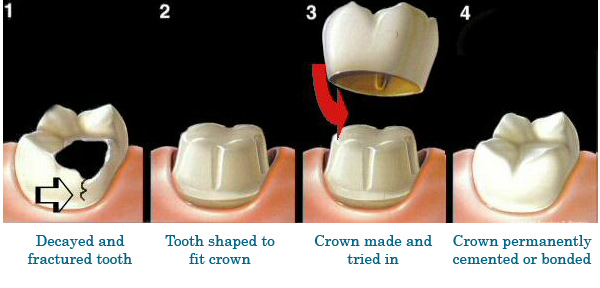Since crowns are one of the more common restorations that people need on their teeth, we are regularly asked the question, “Do I really need a crown?” It is a completely fair question that we encourage you to ask. We strongly feel that with any dental or medical treatment, you should be fully aware of the reasons for treatment, different options, and consequences of proceeding with treatment or not. In this article I will answer some of the more common questions about dental crowns that I frequently hear from patients. I also encourage you to send me a message Here or call the office if you have any other questions that are not answered here.
1. Why do I need a crown?
There are a variety of situations that may require a tooth to be restored with a dental crown. The following are the most common:
a. Large filling: When a tooth has a cavity or a fracture that involves half the width of the tooth or more, it may need to be covered with a crown. This is because the remaining tooth around the large filling is so weak that it is prone to fracture.
b. Root canal: Root canal treatment leaves the tooth hollowed out and predisposes the remaining tooth to cracking. So, a tooth that has had a root canal should be restored with a crown immediately to prevent it from fracturing. This is especially important when it is a back tooth.
c. Broken cusps: Sometimes a cusp (the pointy part) of a tooth will fracture due to trauma. These are the parts of the tooth that take on a lot of the chewing stress, and typically simple fillings are not strong enough to replace them for the long term.
d. Undesirable appearance of teeth: Teeth that have an unacceptable appearance due to colour, shape, or spaces between teeth can be made to look very natural and beautiful with crowns. This is a different reason than the previous three since it is more based on esthetics than function, but it can still be a very valid reason depending on the situation.

Figure 1. The procedure for a dental crown
2. What are my options?
In some cases, while a crown is one option, there can be others. You might opt for a filling instead. Keep in mind, however, that a filling does not prevent you from needing a crown later on. Also, if a substantial portion of your tooth needs filling it may not give you the same kind of protection as crowns do. If the filling is extremely large, it can cause the tooth to break, making it irreparable.
3. What if I wait or do nothing?
A few different scenarios can occur if you choose to not proceed with treatment:
a. Nothing may happen, the tooth could remain as is for many years
b. The tooth could chip or crack and may require a repair.
c. In more rare cases, it may break in a way that would require a root canal
d. The tooth may fracture in a way that renders it not repairable and it would have to be extracted.
4. Is a root canal needed?
Most teeth that have root canals should have crowns, but not all teeth that need crowns require root canals. The need for a root canal depends on whether the tooth is infected or inflamed and painful, or if a very significant portion of the tooth is missing.
How long does the crown last?
The research on dental crowns indicate that most will last an average of 10 to 15 years. However, there are factors that influence this figure. A person who has a high risk of cavities (someone who has to have a couple of fillings each year for example), or grinds their teeth, or has poor oral hygiene habits may find that their crown lasts less than the average. On the other hand, we have some patients who have had the same crowns for 30+ years. The point is that the average lifespan is just that, an average. It should be taken as a guideline, but cannot be considered a guarantee. The mouth can be a very hard environment for the teeth, with chewing pressure and repetitive stresses from the muscles of the jaw. Add to that some of the negative factors listed above and you have the reasons why some crowns fail early. But with a well designed crown and some effort to improve oral care, we can maximize the lifespan of any restoration.



Any financing other than CareCredit. I need crowns and some implants.